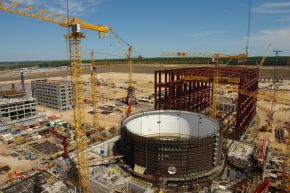Baltic States – CIS, Energy, EU – Baltic States, Legislation, Lithuania, Nuclear power plant
International Internet Magazine. Baltic States news & analytics
Friday, 26.04.2024, 18:24
Sefcovic: stress tests will have to be made at Astravyets NPP
 Print version
Print version |
|---|
“We have certain international principles and internationally-based approaches and I think that after recent tragedies in Fukushima, Japan, the whole of Europe is demanding stress tests. With Belarus we’ll do the same, stress tests will have to be made to build confidence in the safety of this nuclear power plant”, Maros Sefcovic told the reporters after a meeting with Lithuania’s Prime Minister Algirdas Butkevicius in Vilnius on Monday.
The Commission continued talks with Belarus’ officials and shared all information received in relation to the Astravyets nuclear power plant with all EU Member States, including Lithuania, he said.
“I promised the president [Dalia Grybauskaite] and the prime minister that we’ll continue our contacts with Belarus officials in order to ensure all security standards. We’re ready to offer our technical advice and assistance to Belarus,” Sefcovic added.
Parties to the Espoo Convention have stated that the project of the Astravyets nuclear power plant does not comply with the requirements of this document. Lithuania, in its turn, has repeatedly slammed Belarus for failure to ensure the safety of its nuclear power facility, despite its proximity to the Lithuanian capital.
Meanwhile, Minsk has dismissed Lithuania’s reproaches saying that it will implement the highest safety standards at its nuclear power plant.
Stress tests carried out on nuclear power plants are meant to check whether the safety standards implemented at a particular facility comply with all safety requirements. Also, such tests measure the ability of nuclear facilities to withstand damage from hazards such as earthquakes, flooding, terrorist attacks or aircraft collisions.
In response to the 2011 Fukushima nuclear accident triggered by an earthquake and tsunami, stress tests have been carried out on all nuclear power plants in the European Union, Switzerland and Ukraine.
Safety of a nuclear power plant, which Belarus is building in Astravyets close to its border with Lithuania, should be a matter of concern for the entire European Union (EU), Lithuania’s President has said, calling on the Union to consider very seriously the possibilities and potential instruments to restrict the imports of electricity generated by that facility to the EU market.
“We all remember the Chernobyl tragedy. Unsafe nuclear power plants that do not comply with international standards pose a threat to all European people. Hence we have to concentrate efforts of the EU and the whole international community and demand that the Astravyets nuclear power plant should comply with the most stringent international safety standards, that a transparent and independent environmental impact assessment should be carried out and risk and safety assessments should be performed,” Dalia Grybauskaite said in a press release after a meeting with Maros Sefcovic, the European Commission’s Vice-President for the Energy Union, in Vilnius on Monday.
The nuclear facility in Astravyets should not create additional obstacles for electricity generation in the country, for efforts to increase energy efficiency or for the aspiration of the Baltic countries to synchronize their grids with those of continental Europe, she said.
The meeting also emphasized that the Nord Stream 2 gas pipeline to Germany, which Russia planned to build across the Baltic Sea, ran counter to the goals of the EU Energy Union and might be used as a tool for sowing disunity among member states. Grybauskaite also questioned the commercial value of the project in particular as the existing Nord Stream-1 was only used at half capacity.








 «The Baltic Course» Is Sold and Stays in Business!
«The Baltic Course» Is Sold and Stays in Business!

